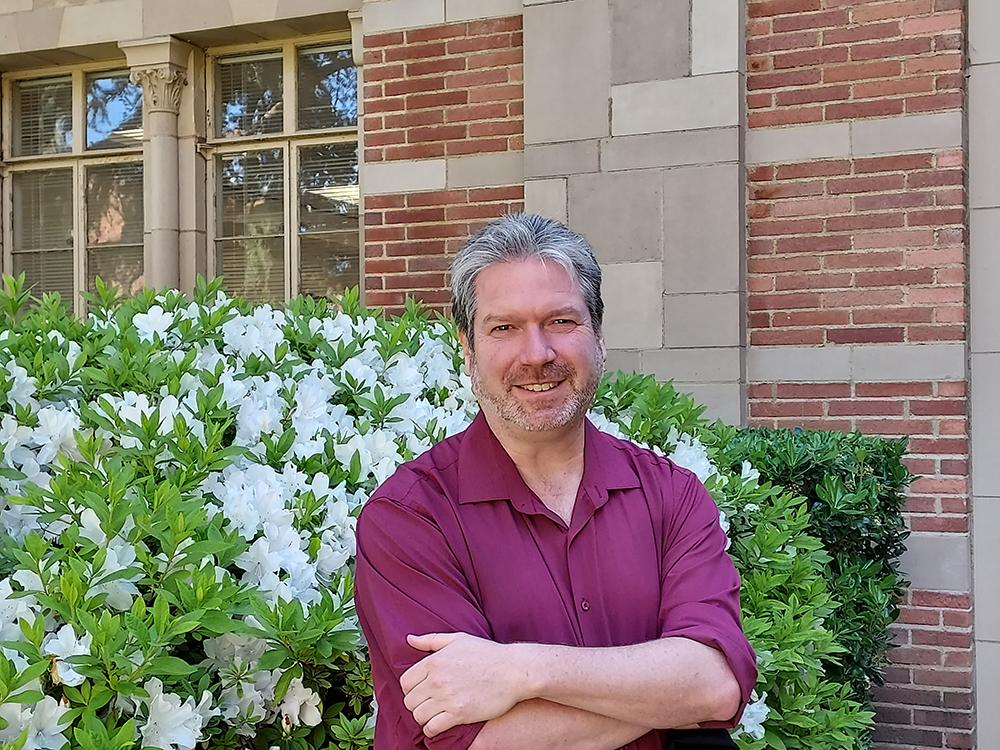Connecting worlds through words with professor Michael Berry
This 2023 Guggenheim Fellow is found in translation

Peggy McInerny
UCLA professor of contemporary Chinese cultural studies and director of the UCLA Center for Chinese Studies, Michael Berry
By Jonathan Riggs | May 8, 2023
There’s a special quality all translators share, according to Michael Berry.
“I like to think of it as a form of possession,” says the UCLA professor of contemporary Chinese cultural studies and director of the UCLA Center for Chinese Studies. “You’re so passionate about a work that you internalize and reproduce it so that it can possess a new group of readers, too.”
One such work that has sparked Berry’s imagination is a recent experimental dystopian trilogy by one of China’s foremost science fiction authors, Han Song. Berry has already translated its first two volumes, “Hospital” and “Exorcism.” For his upcoming work to translate the third, “Dead Souls,” Berry won a 2023 Guggenheim Fellowship.
“These works speak to the absurdity of the modern medical system in a more powerful way than anything I’ve ever read,” he says. “They also serve as a commentary on our current COVID era, even though they were written before it began, as well as a commentary on the individual’s plight in a world in which we are increasingly alienated by technology, bureaucracy and corporatization.”
Berry’s own journey to be able to translate books like Han Song’s — or even to read the language in which they were originally written — was not a straight line. An aspiring jazz musician with hair nearly down to his waist during his high school years, Berry attended four different universities and changed his major three times. Part of what helped him figure out his path came from his college habit of reading a classic book a day.
“I wasn’t an avid reader in high school or earlier in life, but all of a sudden I discovered this exciting new world and felt I had to catch up,” he says. “My romance with this world of ideas helped me realize the limitations of growing up monolingual and having been only exposed to only one perspective of the world.”
And so Berry went to his university’s study abroad office and was placed in a brand-new pilot program where he would spend a year in Nanjing, China, even though he didn’t speak a word of the language.
“I started from the ground up and worked my butt off, going out on my little bicycle to parks and temples and all around the city every evening and weekend,” he says. “I had this big map of Nanjing hanging on the wall in my dorm room and I would just pick a new location. I didn’t know what I was going to find, but I would just go seek it out.”
This time of immersion in Chinese language and culture would prove invaluable for his later career. Today, Berry has written, edited or translated more than 20 books, which include academic studies, oral history projects and, of course, novels — including 10 novels by leading Chinese authors from mainland China and Taiwan.
“I go back and forth between these different types of projects, but when it comes to the novels I translate, I’ve been picking more and more experimental works that challenge me as a reader and as a translator,” he says. “Part of that is in response to the world, where everything seems to be reduced to Tweets and soundbites. I’ve always felt the best way to battle that is to double down on projects that are deep, reflective and challenging.”
That certainly sums up the Han Song trilogy he’s been working on, which has involved frequent back-and-forth with the author — and has resulted in some very polarized Amazon reviews.
“These are such twisted, singular books that I can’t imagine them ever being written again — or anyone other than me translating them!” he says. “I felt like I was the Igor to Han Song’s Dr. Frankenstein, helping him to realize this mad monster he brought to life and making it available to even more readers.”
While Berry still finds freedom and inspiration in music — he likes to improvise on any of his multiple six-string basses — he finds it in his chosen field, too.
“The humanities make us better-rounded individuals so we can contribute to the story of humanity’s ongoing struggle to leave behind a meaningful voice,” he says. “Much of the humanities is about celebrating the human tradition and also coming to terms with the human condition. Wherever your formal education ends doesn’t mean your humanity does — everything we read, write or do comes out of this tradition.”
Read more about Michael Berry here.
For more of Our Stories at the College, click here.




